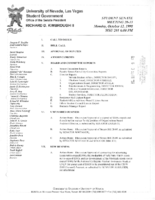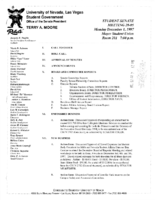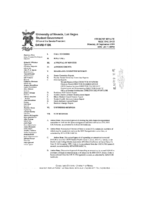Search the Special Collections and Archives Portal
Search Results

Transcript of interview with Joan Johnson by Kim Geary, March 25, 1978
Date
Archival Collection
Description
On March 25, 1978, Kim Geary interviewed Joan Johnson (born 1911 in Oklahoma) in her home in Las Vegas, Nevada. The two discuss Joan Johnson’s personal history and her reasons for originally moving to Las Vegas. Johnson recalls early Las Vegas entertainment, as well as the development of businesses and their unions.
Text

Memo from Edward C. Renwick to E. E. Bennett about the Las Vegas Land and Water Company being required to augment its water supply, 1952
Date
Archival Collection
Description
Discussion of the relevant legal issues and court decisions relating to the question of whether the railroad could be forced to increase water production
Text

Transcript of interview with Perle Garrett by Marilyn Swanson, March 2, 1975
Date
Archival Collection
Description
On March 2, 1975, Marilyn Swanson interviewed her neighbor Perle Garrett (born April 27, 1905 in Overbrook, Kansas) in her home in Boulder City, Nevada. This interview covers Boulder City during the 1930s, with special focus on the building of Boulder Dam. Mrs. Garrett relocated to Boulder City because her husband Theodore Garrett was one of the workers at the dam. She also discusses Six Companies houses, family life, the weather, churches in Las Vegas and recreational activities for local children. Her husband is also present during the interview.
Text

Meeting minutes for Consolidated Student Senate University of Nevada, Las Vegas, October 12, 1998
Date
Archival Collection
Description
Text

Meeting minutes for Consolidated Student Senate University of Nevada, Las Vegas, December 1, 1997
Date
Archival Collection
Description
Text

Meeting minutes for Consolidated Student Senate University of Nevada, Las Vegas, September 27, 1999
Date
Archival Collection
Description
Text

Meeting minutes for Consolidated Student Senate, University of Nevada, Las Vegas, March 20, 1979
Date
Archival Collection
Description
Text

Gerry Rojas-Cantres oral history interview: transcript
Date
Archival Collection
Description
Oral history interview with Gerry Rojas-Cantres conducted by Barbara Tabach on January 29, 2021 for the Latinx Voices of Southern Nevada Oral History Project. Gerry talks of his arrival to Las Vegas after growing up in Puerto Rico. He also discusses his work as both a porter at McCarran Airport and a shop steward for the Culinary Workers Union Local 226.
Text

Horacio Lopez oral history interview: transcript
Date
Archival Collection
Description
Oral history interview with Horacio Lopez conducted by Laurents Bañuelos-Benitez on September 05, 2018 for the Latinx Voices of Southern Nevada Oral History Project. In this interview, Lopez discusses his early life in Cordova, New Mexico and arriving to Las Vegas, Nevada in 1963. He recalls the establishment of the Nevada Association of Latin Americans (NALA), the increase of Latin Americans in the southwest region of the United States, and his role as the Vice President of the Latin Chamber of Commerce. Lastly, Lopez discusses his thoughts on the future of Latino culture.
Text

